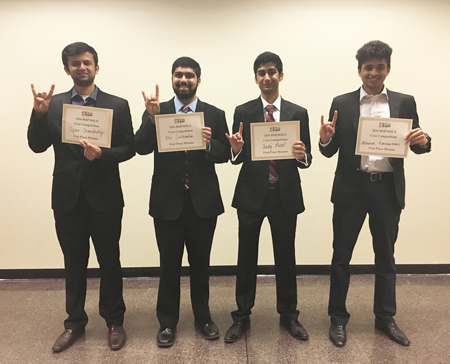
First Place Team: Abhishek Ramchandani, Eric Saldanha, Tejas Choudhary, and Andy Patel
The Business Honors Program in partnership with Women in Computer Science (WiCS), hosted its first interdisciplinary case competition focused on Austin traffic this past weekend. Given the population explosion, record number of crashes, and insufficient infrastructure development, students were asked to provide City of Austin with a technology-driven solution to substantially alleviate these transportation issues for a significant portion of the population. Forty-four students from Business Honors, Computer Science, and Engineering competed for the top spots. The teams thoroughly enjoyed the chance to work with people outside of their majors, and the winning team talked about how the interdisciplinary team structure helped them approach the case from multiple angles. BHP sophomore Eric Saldanha said, “I focused on all the political considerations, while the engineering and CS majors figured out the mechanics behind our solution, and the other BHP-er ran the numbers to ensure the financial sustainability.”
The competition judges included experts from the City of Austin, the Austin Transportation Department, transportation start-ups, venture capitalists, and UT professors in IROM, urban planning, and civil engineering. They watched eleven teams pitch innovative and imaginative solutions, but it was ultimately team Pacific Solutions, made up of Abhishek Ramchandani, Eric Saldanha, Tejas Choudhary, and Andy Patel, that won our judges’ approval and took home first place in the competition. Their solution focused on two key aspects: (i) Intelligent Transportation System (ITS) – automated traffic signaling, hard shoulder reform, and variable speed limits, and (ii) Traffic Demand Management (TDM) – a dynamic pricing model for parking, a carpooling program, and staggered work shifts. The judges were highly impressed with the quality of the presentations, the innovative ideas, and the incredible team work reflected by the teams.
This competition focused on a public sector issue that Austin residents face on a daily basis and gave students a chance to make a significant impact in improving the safety and mobility of our city. We were extremely impressed to hear that many teams had already reached out to key figures in government influencing the transportation dialogue to present their findings outside of the competition. Congratulations to all the teams that competed, and we hope to continue this new tradition of collaborating with other UT colleges on real, societal issues every year.
